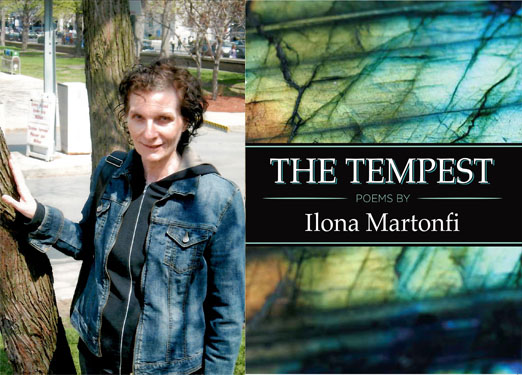In this Inanna blog Ilona Martonfi, author of THE TEMPEST, introduces Refugee. Haiku. Bashō’s Crow. Tanka. The Tempest Review by The Miramichi Reader. “LOCKDOWN” Tanka p. 59. Language. Pontoon Bridge. Otthon (Home). Budapest, 1945. Korneuburg, 1945. Schillerswiesen, 1946. Donaustauf, 1948. Pirka, 1951. Free Verse. “THE UGLIEST GIRL” Free verse p. 30. In Conclusion: BLÁR Ordering Your Poetry Manuscript. “DESERT DANCE” Tanka.
Refugee
A refugee was a person who is forced to leave their country due to natural disasters or war and conflict owing to a well-founded fear of being persecuted for reasons of race, religion, nationality, membership of a particular social group, or political opinion, is outside the country of their nationality, and is unable to or, owing to such fear, is unwilling to avail him/herself of the protection of that country.
Refugee – Wikipedia
The room where I write. It contains a computer, a wooden desk, a chair, my acrylic paintings. A stained glass lamp. And at one end, windows set into the wall, red geraniums in a clay pot, schlumbergera, a cactus, spider plant. In the alley, crows cawing in the bare ash trees.
Fragmented empty rooms become the subject. Abandoned without artificial light. The light of the winter sun, and moonlight. Hungarian war refugee. I lived here once by the Danube river. Budapest. Korneuburg. Schillerswiesen, Donaustauf. Pirka. All about place. People and place, about home.
Haiku
Haiku is a type of short form poetry originally from Japan. Traditional Japanese haiku consist of three phrases that contain a kireji, or “cutting word”, 17 on (phonetic units similar to syllables) in a 5, 7, 5 pattern, and a kigo, or seasonal reference.
Haiku – Wikipedia
Bashō’s Crow
Written in the autumn of 1680. Matsuo Bashō was then living in Edo (Tokyo) and teaching poetry to a group of disciples.
kareeda ni / karasu no tomarikeri / aki no kure
on a bare branch / a crow is perched / autumn evening
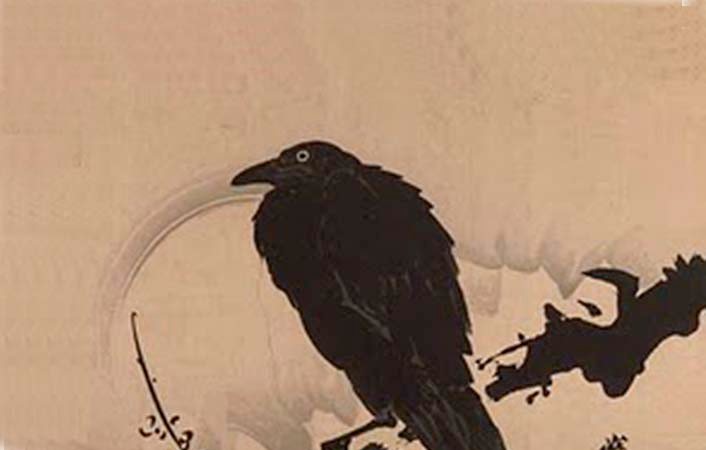
Image by Kawanabe Kyōsa (1831 – 1889)
A crow on a withered branch – matsuo-basho-haiku
Tanka
Tanka, which means “short song,” is separated by the three upper lines (kami no ku) and the two lower ones (shimo no ku). Broken into five poetic lines with 5/7/5/7/7 syllables in each line. The brevity of the poem and the turn from the upper to the lower lines signals a shift or expansion of subject matter.
https://poets.org › glossary › tanka
The Tempest by Ilona Martonfi reviewed by The Miramichi Reader
November 6, 2022 by Alison Manley
Dancing through disasters, myths and legends, art and artists, as well as personal reflections on self and family history, Ilona Martonfi’s collection, The Tempest, is incredibly deep and also incredibly spare. Martonfi leaves you to build your images from what she leaves on the page – and what words she gives you are so carefully, deliberately chosen that the art is twice beautiful. Once for the sheer brilliance of language use, and a second time for the beauty of the images evoked.
My favourite poem was “Lockdown.” It’s a timeless poem, which could be set in our current pandemic times, or a long ago plague, capturing the isolation and the difficulty of living through a historical moment.
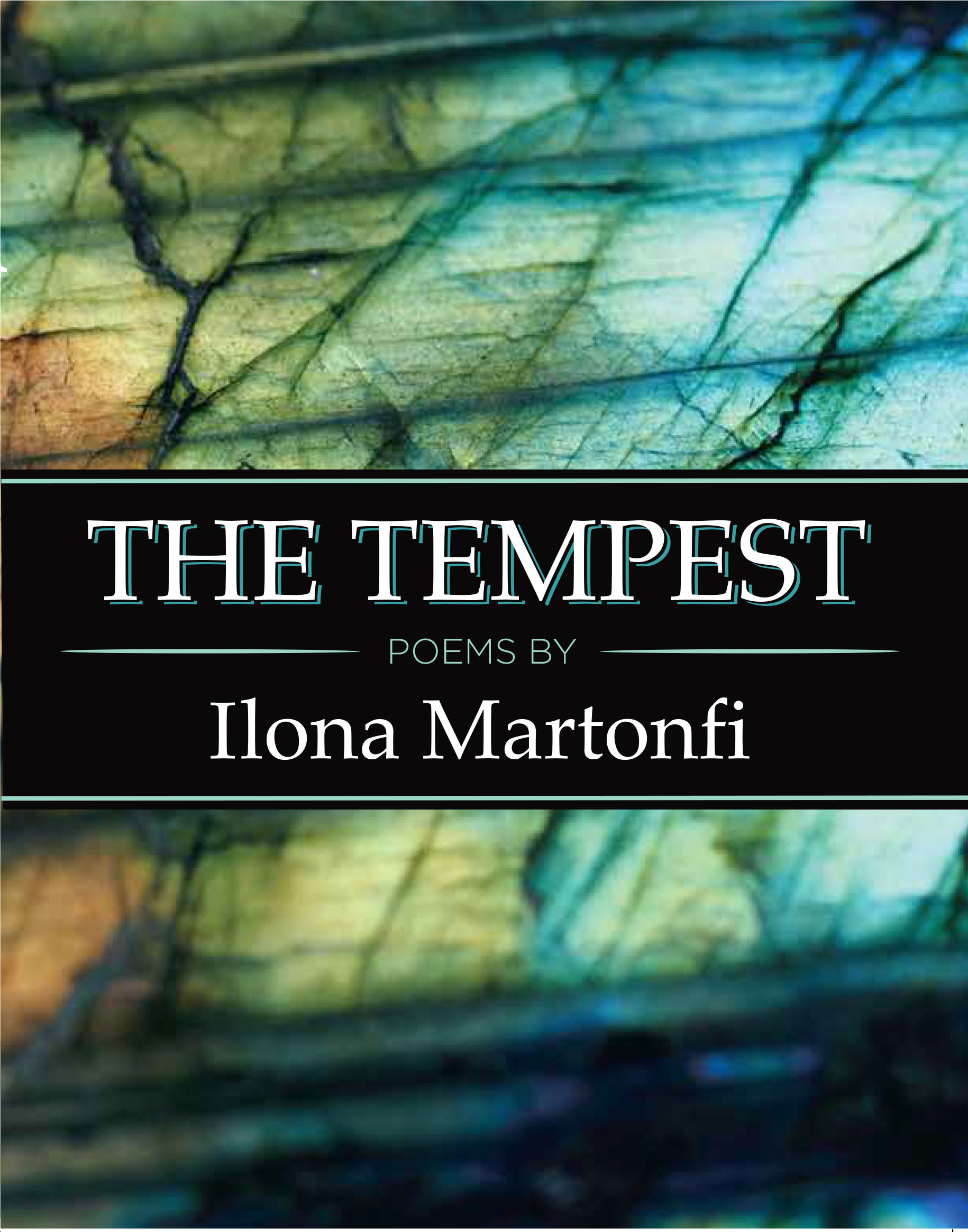
The Tempest – Inanna Publications
https://www.inanna.ca ›
Please find here an excerpt from a tanka set “LOCKDOWN” p. 59 The Tempest (Inanna Publications, 2022).
deep in the mountains / walking through scrub forest / a masked shrike calls out / ah, when I hear its schgra-a-a shriek / “the plague is come”
Language
The forgetting, remembering, and relearning of language is one of the most binding and alienating elements of refugees.
The Babel Within | Gavin Francis
By the time I was twelve, I had lived in four countries. Born in Hungary, war refugee in Austria and Germany, immigrant in Canada. Living in Quebec. I can speak five languages, fluent in English, and conversational fluency in Hungarian, German, French, and Italian.
Pontoon Bridge
A pontoon bridge uses floats or shallow-draft boats to support a continuous deck for pedestrian and vehicle travel. The buoyancy of the supports limits the maximum load that they can carry.
Pontoon bridge – Wikipedia
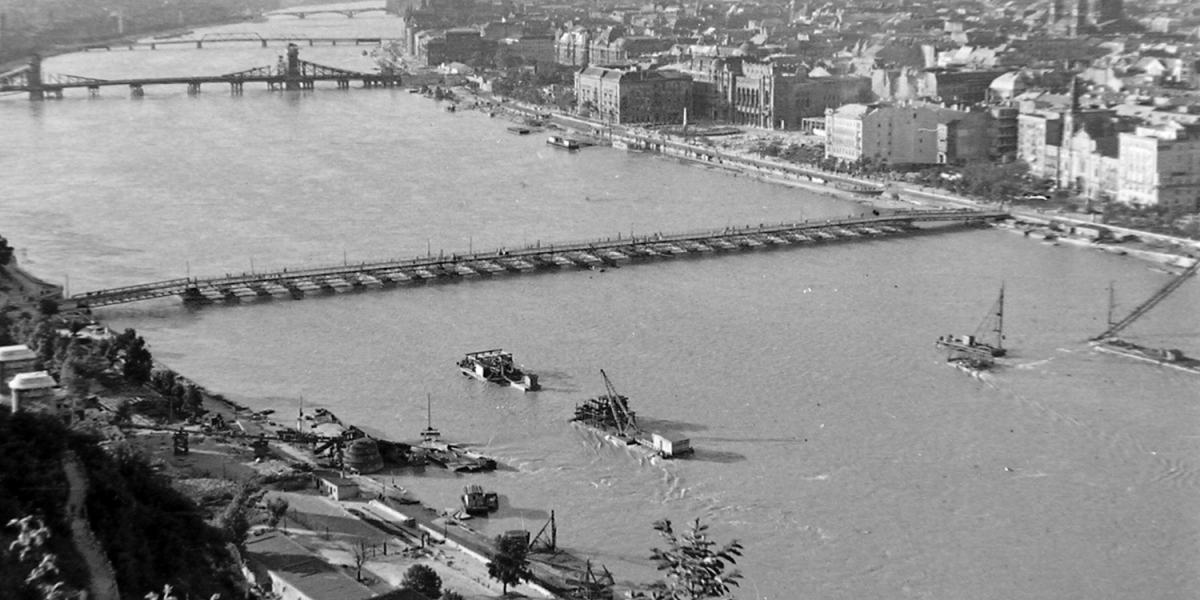
Photo: Petőfi Pontoon Bridge 1945
pestbuda.hu, Csaba Domonkos, Histories
In my imagination of this newly arrived memory, there’s a pigtailed refugee girl, a fenced vegetable garden, a red brick house full of Hungarian words, a kitchen with a cement floor. Bare bulb hanging from ceiling. I write entirely to find out what I’m thinking, what I’m looking at, what I see and what it means. What I want and what I fear.
Otthon (Home)
I was born in Magyarország, landlocked country of central Europe. Where Hungarian belongs to the Ugric branch of Finno-Ugric, where along with the Ob-Ugric languages, Mansi and Khanty, spoken in western Siberia.
Three words for home – itthon, otthon and haza
Hungarian language – Encyclopedia Britannica
Budapest Siege, 1945
After the 100-day Soviet siege, after all five bridges of Budapest are bombed by the fleeing German Nazis. After, I pack my plush dog. My lace-up boots. April 1945, my father drives his Opel truck across a pontoon bridge, fleeing to Vienna in Austria. My father Josef, my mother Magda, my sister Erna is 4, I am 3, and baby Eva one years old. My grandmother Mariska. Featherbeds. The pine bahut with mother’s cross stitch tablecloth. Her brown wool wedding suit.
Korneuburg, Austria, 1945
I, who—at age 3. War refugee from Budapest, 1945 we live for six months in Ungarnlager barracks, a refugee camp at Korneuburg, a suburb of Vienna, Austria.
Ways in which our past keeps speaking to us: through sepia photographs, through music, the cimbalom, the zither, through the spectre of places that map themselves over the places we live in.
The loss of haza, my homeland. Loss of my Danube river in Budapest. Loss of my language. The voices in the street. The Magyar language. A pontoon bridge. Living in a camp at Korneuburg. I can never belong, and I will never belong to the river.
Schillerswiesen, Bavaria, 1946
I, who—at age 4. In 1946 we move to Schillerswiesen, near Falkenstein, in the Bavarian Forest. A windowless storage room a farmer gives us at the back of his house. The cold rushing creek. Dandelions. Blueberries. Raspberries. “Ausländer!” children yell. “Foreigner!”
Donaustauf, Bavaria, 1948
I, who—at age 6. Donaustauf by the river, the Bavarian Forest, the Kalkberge. The Chalk Mountains embedded into my “Flüchtling” childhood. In the barrack where I live, there are no windows in the kitchen, no plum trees in the yard. And in Schwabelweiss village, my first school. My first church.
Army Jeeps race by on Walhallastraße in Donaustauf. The Allied-occupied Zone in post-war Germany. At our school, porridge with big plump raisins ladled into my tin cup by U.S. troops.
Pirka, Bavaria, 1951
I, who—at age 9. My fourth grade teacher molests me during movie days. In the dark. Blinds drawn. 1951. Father moves us to Pirka, a refugee settlement in Bavaria. My best friend is Ingrid Langer from Silesia, Prussia. Every day I go to my classroom full of girls and boys who resemble my buttercups. And the dusty rubble of stone houses. Pirka, a former Nazi Messerschmitt airport and SS subcamp of Flossenbürg. We have a pond. Bomb craters. Wild apple trees. A kind of dark apple. Willow trees. A linden in the yard. Writing crumbles in plain language.
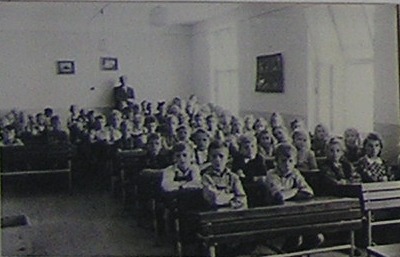
My 4th grade class photo in Pirka, Bavaria, 1951
(I am on the right in the first row near the window)
Einmaleins & Ziegelklopfen – – heimatforschung-regensburg.de
Free Verse
A poetry of organic rhythms, of deliberate irregularity, improvisatory delight. Free verse is a form of nonmetrical writing that takes pleasure in a various and emergent verbal music.
Free Verse | Academy of American Poets
Offering an excerpt from a Free Verse p. 30 The Tempest.
THE UGLIEST GIRL
[…]
Recurring dreams in which
your mother and you sit in a cellar
to unremember
summer flowers crying.
[…]
In Conclusion
BLÁR
Ordering Your Poetry Manuscript
If this really was a book, what am I leaving out? What have I been scared to write about? What would I want to be sure was in these pages if this was published? Voices drawn from historical moments, and pulled from the shadows of acrylics recast the fraught human world, brushstroke by brushstroke. Witness poems, Climate Change, Elegies. Ekphrastic poems. The title, BLÁR (blue) from Old Norse blár. A lyric ordering, in which each poem is linked to the previous one, repeating a word, image, subject, or theme. This sometimes provides a continuation, sometimes a contrast or argument.
Ada Limón on How to Write a Poetry Collection
April Ossmann, Denise Low, poetry, poetry manuscript order
DESERT DANCE
Two Tanka
desert dance triptych / mixed media, acrylic, and clay / all of tomorrow dance / is a wish that I have / scratched onto one canvas /
the cut-out silhouette / of a figure in full stride / rising from its bronze / clocking humanity through time / its passage upon the Earth
Author bio: Ilona Martonfi is a Montreal poet born in Budapest. She is a writer, editor, creative writing teacher, and founder of the writing group, Rue Towers Writers. She is the author of the poetry books, Blue Poppy (2009), Black Grass (2012), The Snow Kimono (2015), and Salt Bride (2019), as well as seven chapbooks, Visiting the Ridge, Charivari, Magda, Adagio, Mud, Moth and Black Rain. Ilona is Founder and Literary Curator of The Yellow Door and Visual Arts Centre Reading Series and Argo Bookshop’s Reading Series. She is a recipient of the QWF 2010 Community Award. Ilona has published extensively in print and online literary publications. She was a Finalist for the 2007 Quebec Writing Competition. Her story, “My Daughter, Marisa,” was published in CBC Story Anthology III, In Other Words: New English Writing from Quebec (2008), and Ilona’s “Stories of Belonging” was shortlisted for Canada Writes in the adult category (2014). She was also a StepAway Magazine nominee for the 2018 Pushcart Prize for the poem “Dachau Visit on a Rainy Day”. The Tempest is her fifth poetry collection.

